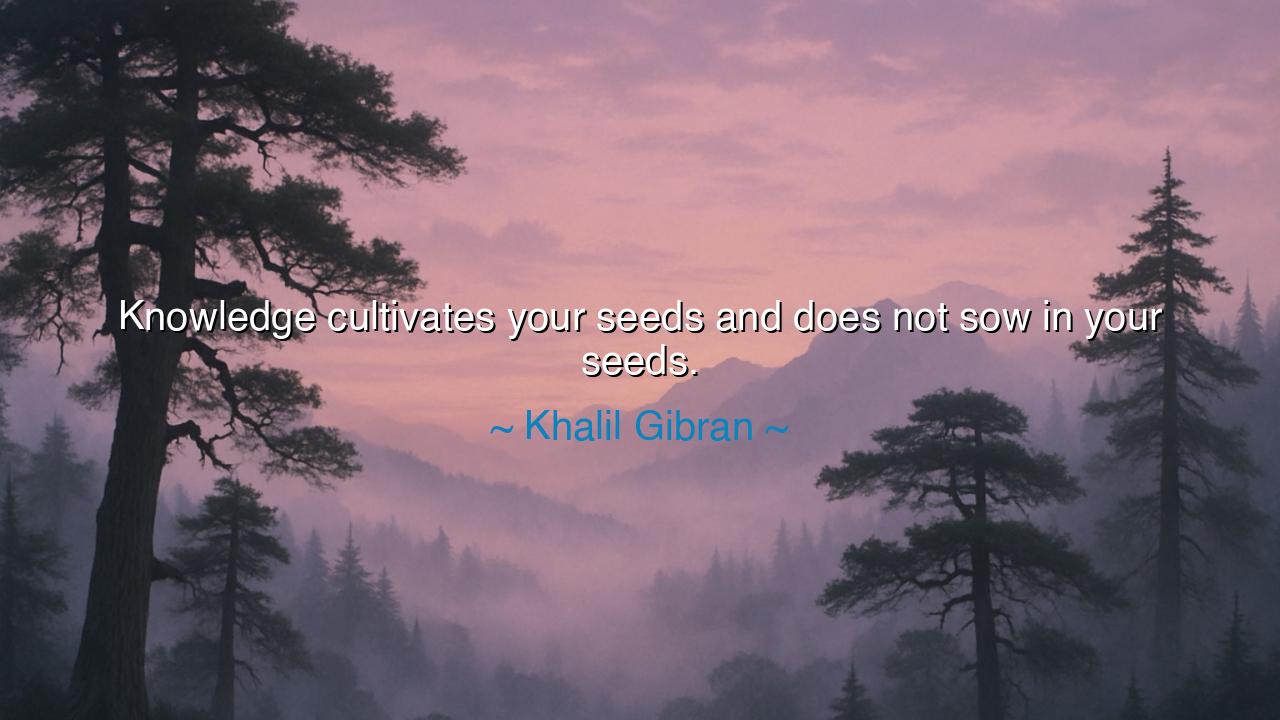
Knowledge cultivates your seeds and does not sow in your seeds.






Khalil Gibran, the mystic poet whose words dance between earth and heaven, once wrote: “Knowledge cultivates your seeds and does not sow in your seeds.” In this saying he speaks with the voice of one who has gazed into the heart of the soul. He tells us that wisdom does not enter us as something foreign, planted from without. Rather, it awakens what is already within, nourishing and strengthening the hidden seeds that lie dormant in every spirit. Knowledge is not an imposition—it is a gentle gardener, drawing forth the life that was already there, waiting to grow.
The origin of this truth lies in Gibran’s lifelong meditation on the relationship between man and the divine, between the outer world and the inner essence. Born in Lebanon and shaped by both Eastern mysticism and Western thought, he understood that each human being carries within themselves the spark of greatness, the kernel of individuality. No teacher, no book, no system of schooling can create that spark; it is already present. The task of knowledge is to nurture, to refine, to cultivate, so that what is hidden may come forth into the light.
History provides us with many echoes of this wisdom. Consider Socrates, who declared himself not a teacher but a midwife of the soul. He did not claim to sow wisdom into his students, but to draw forth from them what was already waiting to be born. His method of questioning was cultivation, not planting. In this way, Gibran’s saying is aligned with the oldest philosophies: that the seeds of truth are already within us, and the role of knowledge is to tend them, to water them, to bring them into bloom.
The story of Helen Keller offers another radiant example. Blind and deaf from infancy, she seemed locked away from the world of communication. But within her there already existed the seed of thought, the hidden fire of spirit. When Anne Sullivan came as her teacher, she did not create intelligence in Helen. She cultivated what was already there, showing her how to give voice to what her soul already knew. This is the living proof of Gibran’s teaching: knowledge does not impose—it awakens.
The deeper meaning of Gibran’s words is this: each person is already complete in essence. You are born with your seeds—your gifts, your passions, your potential. No teacher or institution can place them within you; they can only help them grow. To mistake education as something that fills the mind from outside is to misunderstand. True knowledge is like the rain upon the earth, which does not create the seed but nourishes it until it becomes a tree.
The lesson for us is profound. Do not despise yourself, thinking you lack greatness because it has not yet appeared. Within you are seeds waiting to be cultivated. Seek teachers and experiences not as givers of truth, but as gardeners who can help you grow what is already yours. And when you teach others, remember: you are not planting into them your own image, but helping them to bring forth their own. Respect the individuality of every soul, for no two gardens bloom alike.
Practical action lies before us. Nurture your own inner seeds through reflection, practice, and humility. Read and learn not to copy others, but to discover yourself. Encourage your children, your friends, your students not by forcing them into molds, but by helping them find their own roots and branches. And in every encounter with knowledge, ask not, “What am I being given?” but “What in me is being awakened?”
Thus Gibran’s words endure as an eternal truth: knowledge does not sow—it cultivates. It does not create you; it reveals you. It does not impose from without; it awakens from within. Let us then walk as gardens tended by wisdom, growing into the fullness of what we already are, until the hidden seeds within us rise into trees that give shade, fruit, and beauty to the world.






AAdministratorAdministrator
Welcome, honored guests. Please leave a comment, we will respond soon